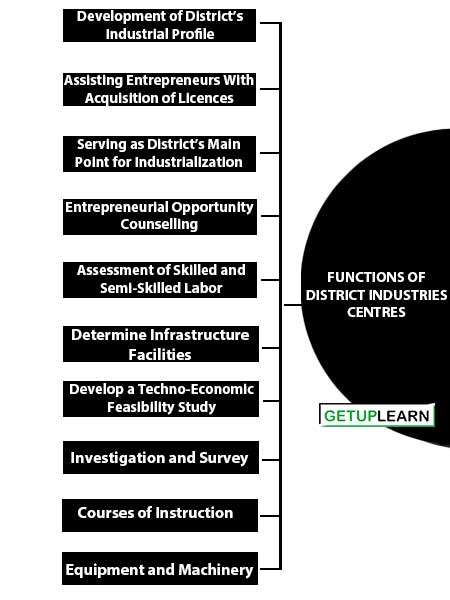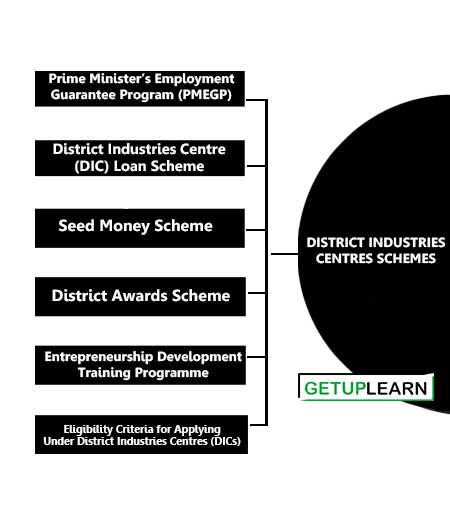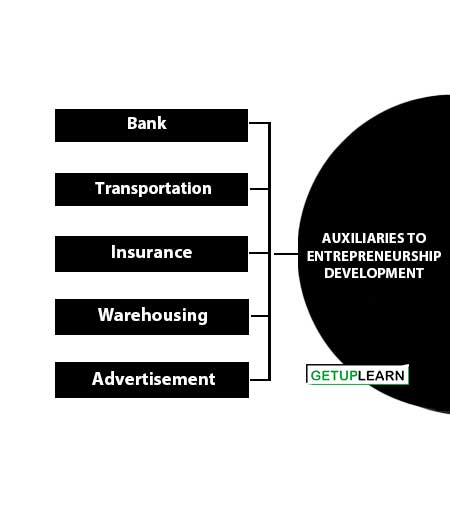Table of Contents
- 1 What is the District Industry Centre (DIC)?
- 2 Objectives of District Industries Centre (DIC)
-
3 Functions of District Industries Centres
- 3.1 Development of District’s Industrial Profile
- 3.2 Assisting Entrepreneurs With Acquisition of Licences
- 3.3 Serving as District’s Main Point for Industrialization
- 3.4 Entrepreneurial Opportunity Counselling
- 3.5 Assessment of Skilled and Semi-Skilled Labor
- 3.6 Determine Infrastructure Facilities
- 3.7 Develop a Techno-Economic Feasibility Study
- 3.8 Provide Advice to Entrepreneurs on Their Investments
- 3.9 Investigation and Survey
- 3.10 Courses of Instruction
- 3.11 Equipment and Machinery
- 3.12 Raw Materials
- 3.13 Arrangement of Loans
- 3.14 Marketing
- 3.15 Khadi and Village Industries
- 4 District Industries Centres Schemes
- 5 Auxiliaries to Entrepreneurship Development
- 6 FAQs Section
What is the District Industry Centre (DIC)?
The District Industries Centre (DIC) is a government-run program aimed at fostering small village and cottage industries in a certain area. Since its inception in 1978, the DICs have been constructed in several districts across India at various times.
The District Industries Centres, which are located at the district level, provide all of the required services and support to help entrepreneurs develop MSMEs (Micro, Small, and Medium enterprises).
Objectives of District Industries Centre (DIC)
The important objectives of District Industries Centre (DIC) are:
- Accelerate the overall efforts for the industrialization of the district.
- Rural industrialization and development of rural industries and handicrafts.
- Attainment of economic equality in various regions of the district.
- Providing the benefit of the government schemes to the new entrepreneurs.
- Centralization of procedures required to start a new industrial unit and minimization of the efforts and time required to obtain various permissions, licenses, registrations, subsidies, etc.
Functions of District Industries Centres
The District Industries Center (DIC) Program was established in 1978 as a government-sponsored initiative with the goal of providing all services and support to village and small-scale enterprises under one roof in order to promote the development of small-scale industry in the country’s widely dispersed rural areas and small towns.
The District Industries Centres (DICs) provide a variety of key responsibilities for the upliftment of a district and the inclusion of that district on India’s industrial map. The following are some of the functions of District Industries Centres (DICs):
- Development of District’s Industrial Profile
- Assisting Entrepreneurs With Acquisition of Licences
- Serving as District’s Main Point for Industrialization
- Entrepreneurial Opportunity Counselling
- Assessment of Skilled and Semi-Skilled Labor
- Determine Infrastructure Facilities
- Develop a Techno-Economic Feasibility Study
- Provide Advice to Entrepreneurs on Their Investments
- Investigation and Survey
- Courses of Instruction
- Equipment and Machinery
- Raw Materials
- Arrangement of Loans
- Marketing
- Khadi and Village Industries

Development of District’s Industrial Profile
This aids in determining the advantages and disadvantages of establishing various industries in the district based on the availability of infrastructure, raw materials, labor, and land in the area.
Assisting Entrepreneurs With Acquisition of Licences
A variety of permits are necessary to set up an industrial unit, including those from the electricity board, the no-objection certificate, the water supply board, and others. The District Industries Centres (DICs) enable the issuance of these permits, making it easier for entrepreneurs to establish industrial units in their particular districts.
Serving as District’s Main Point for Industrialization
The District Industries Centres (DICs) serve as a focal point for making progress in the field of industrialization. The District Industries Centres (DICs) handle everything from giving various permissions and permits to facilitating financing and granting awards.
Entrepreneurial Opportunity Counselling
A lack of awareness about an existing opportunity causes more harm than a lack of opportunity. District Industries Centres (DICs) assist in bringing numerous opportunities to the forefront to assist entrepreneurs. In addition to the district’s industrialization, this aids in the creation of job prospects.
Assessment of Skilled and Semi-Skilled Labor
District Industries Centres (DICs) assist in making the greatest use of their platform to identify the labor that is best suited to the market. This prevents underemployment.
Determine Infrastructure Facilities
Infrastructure facilities are a top priority for each place to develop in order to identify the potential that may be tapped from a specific area. The District Industries Centres identify facilities such as power, roads, warehouses, banking, and quality testing facilities, among others (DICs).
Develop a Techno-Economic Feasibility Study
The District Industries Centres (DICs) develop a techno-economic feasibility report that analyses the performance of an industrial product, process, or service in order to enhance regions that require it.
Provide Advice to Entrepreneurs on Their Investments
The District Industries Centres (DICs) provide advice to businesses on a variety of investments. In this way, they provide consulting services to entrepreneurs to assist them in making better financial selections.
Investigation and Survey
The District Industries Center surveys existing and future industries, as well as raw materials and human resources. It anticipates the market for a variety of products. It also develops techno-economic feasibility analyses in order to provide enterprises with investment recommendations.
Courses of Instruction
The District Industries Center also holds training sessions for small and micro business owners. It serves as a link between entrepreneurs and small industry service institutes, allowing the latter to provide new and improved product lines and quality to the former.
Equipment and Machinery
The District Industries Center identifies areas where machinery and equipment can be purchased, as well as arranges for machinery to be supplied on a hire-buy basis.
Raw Materials
The District Industries Center gathers information on the commodities required by various divisions and arranges for bulk purchases. As a result, small businesses can receive their raw materials at a cheap price.
Arrangement of Loans
It makes the appropriate agreements with Lead Banks and other Financial Institutions to give financial support to entrepreneurs. It also assesses the application and keeps track of the district’s industrial credit flow.
Marketing
Market surveys and market development programs are conducted by the District Industries Center. It also develops marketing channels, maintains contact with government procurement organizations, and keeps entrepreneurs up to date on market intelligence.
Khadi and Village Industries
The development of khadi and village industries, as well as other cottage businesses, is a priority for District Industries Centers. It also maintains close ties with the State Khadi Board and organizes rural artisan training programs.
District Industries Centres Schemes
A number of projects that fall under the purview of District Industries Centres have been launched (DICs). These programs assist in achieving the objectives of building District Industries Centres (DICs). There are both centrally funded and central sector programs in this category. The following schemes fall under the DIC:
- Prime Minister’s Employment Guarantee Program (PMEGP)
- District Industries Centre (DIC) Loan Scheme
- Seed Money Scheme
- District Awards Scheme
- Entrepreneurship Development Training Programme
- Eligibility Criteria for Applying Under District Industries Centres (DICs)

Prime Minister’s Employment Guarantee Program (PMEGP)
The Ministry of Micro, Small, and Medium Enterprises (MSME) introduced this centrally supported scheme in 2008. The PMEGP strives to create job opportunities in rural and urban areas for educated unemployed persons.
Khadi & Village Industries Commission is the scheme’s main agency for execution (KVIC). Banks will lend 90-95 percent of the money under this program, with the applicant’s contribution being 5-10 percent of the project cost in the industry, service, or commercial sector.
District Industries Centre (DIC) Loan Scheme
This scheme is for self-employed people and small businesses in cities and rural areas with a population of fewer than a lakh people and a capital investment of less than Rs. 2 lakh. Village industries, handicrafts, handlooms, and silk & coir industries are among the minor units listed by the Small Scale Industries Board.
The margin money for entrepreneurs in the general category will be 20% of the total investment, or Rs. 40,000. (Whichever is lesser). The margin money for businesses in the SC/ST category will be 30 percent of the total investment, or Rs. 60,000. (Whichever is lesser).
Seed Money Scheme
This program is designed for self-employed people who work for a living or run their own businesses. Financial aid from institutions in the form of soft loans. The project cost for obtaining a loan under the seed money scheme has been raised to Rs. 25 lakhs.
Seed money support of up to 15% of the project cost is available for initiatives up to Rs. 10 lakhs. The assistance granted to SC/ST/OBC will be 20% of the project cost; the maximum amount of assistance provided will be Rs. 3.75 lakhs, with 75% of the project cost being in the form of a bank loan.
District Awards Scheme
State governments have begun honoring entrepreneurs with prizes at the district level to raise their spirits and recognize their efforts and successes. The entrepreneurs to be recognized will be chosen by a District Advisory Committee created at the district level.
The District Awards Function takes place on Vishwakarma Jayanti Day, which varies from year to year. The award ceremony includes a display of the entrepreneur’s items for sale and exhibition, as well as workshops and discussions on the topic.
Entrepreneurship Development Training Programme
This program was created to provide training to educated unemployed persons in order to encourage them to start their own businesses or work in skilled-wage jobs. The following training programs are part of the Entrepreneurship Development Training Program:
- Entrepreneurship Introductory Programme (Udyojakata Parichay Karyakram)
- Entrepreneurship Development Training Programme (12-Day residential)
- Technical Training Programme (12 Days to 2 Months non-residential)
Eligibility Criteria for Applying Under District Industries Centres (DICs)
Loans are available through the District Industries Centres (DICs) under the various schemes listed above. The District Industries Centres (DICs) promote and implement these plans, and loans can be obtained under a variety of schemes with differing qualifying conditions. Who can apply for loans under DIC? Below are the entities that are eligible to avail of loans under the DIC scheme:
- The entities who can avail of this loan involve safai karamcharis families, scheduled castes, and other backward classes (OBCs)
- Physically disabled young professionals like chartered accountants, engineers, advocates, doctors, architects, physiotherapists, pathologists, pragmatists, etc. can also avail of this loan.
Auxiliaries to Entrepreneurship Development
The following are significant auxiliaries that aid in the promotion of commercial activities:

Bank
The most significant auxiliary institution for entrepreneurship development. They assist with the resolution of financial issues in the workplace. In addition to his own financial resources, the entrepreneur relies on the bank for funds.
Banks provide security for entrepreneurs’ wealth, as well as overdraft and cheque payment options. They also assist in the advancement of business, asset transfer, and a variety of other services for the entrepreneur to promote entrepreneurial activity.
Transportation
Transportation is critical to a country’s success in business and trade. Business activity can advance by land, maritime, and air transport if good transportation facilities are provided. Only because of the enhanced modes of transportation accessible has the scope of the company expanded internationally.
Insurance
Insurance is widely regarded as the most effective technique for mitigating risk. There are risks in every field of business. As a result, the entrepreneur enters into a contract with an insurance company in which the entrepreneur pays the premium and the insurance company guarantees to compensate the entrepreneur for losses sustained as a result of defined causes/accidents.
Warehousing
Products are manufactured at a specific period, but they cannot all be consumed or sold at the same time. They must be preserved in a secure location for future use or sale. Wheat, rice, cotton, tobacco, and other commodities are kept in designated stores until demand for them develops.
Commodities such as woolen clothing must also be stored and protected until seasonal demand arrives. Warehouses are required for the storage of such commodities.
Advertisement
Large-scale production needs good marketplaces, which necessitates the use of advertising to ensure that the items are quickly sold. The term “advertising” refers to the act of informing people about the goods and services that are being produced, delivered, and so on. Advertisements are quite vital in today’s world.
FAQs Section
What are the functions of district industries centres?
The following are the functions of district industries centres:
1. Development of the District’s Industrial Profile
2. Assisting Entrepreneurs With the Acquisition of Licences
3. Serving as the District’s Main Point for Industrialization
4. Entrepreneurial Opportunity Counselling
5. Assessment of Skilled and Semi-Skilled Labor
6. Determine Infrastructure Facilities
7. Develop a Techno-Economic Feasibility Study
8. Provide Advice to Entrepreneurs on Their Investments
9. Investigation and Survey
10. Courses of Instruction.
What are the district industries centres schemes?
The district industries centres schemes are:
1. Prime Minister’s Employment Guarantee Program (PMEGP)
2. District Industries Centre (DIC) Loan Scheme
3. Seed Money Scheme
4. District Awards Scheme
5. Entrepreneurship Development Training Programme
6. Eligibility Criteria for Applying Under District Industries Centres (DICs).


